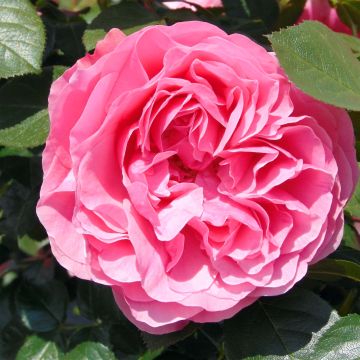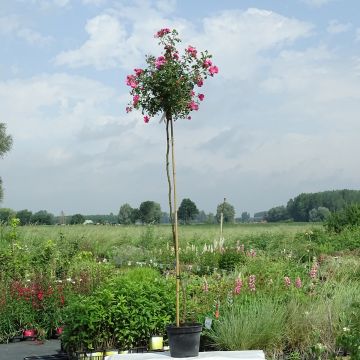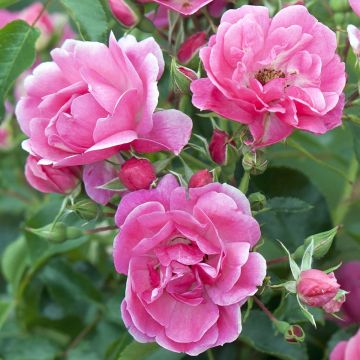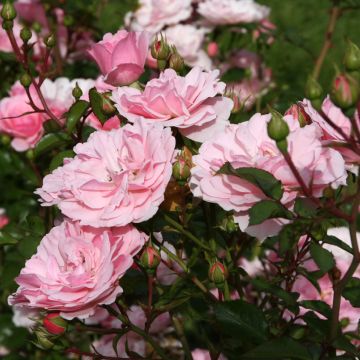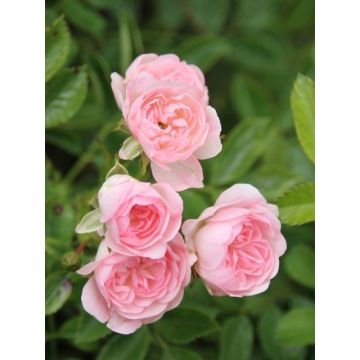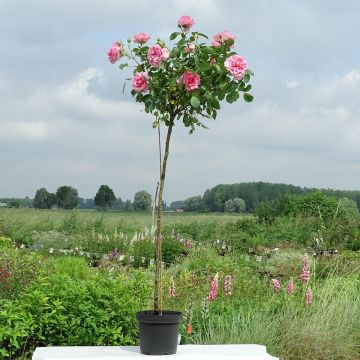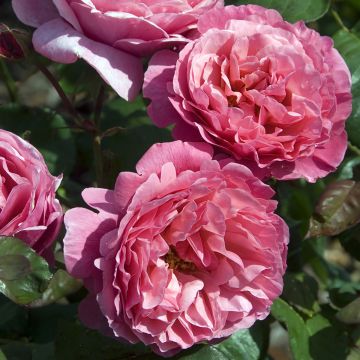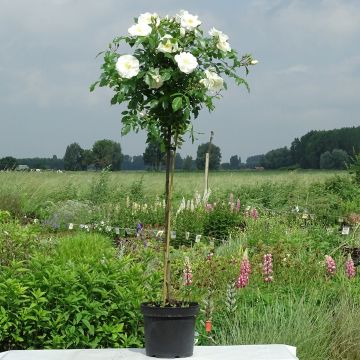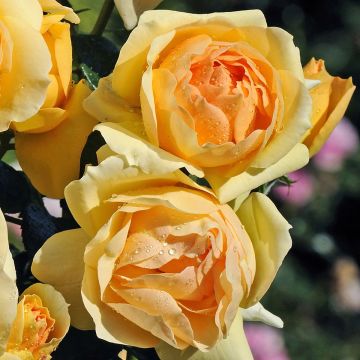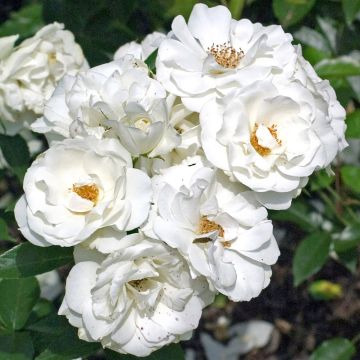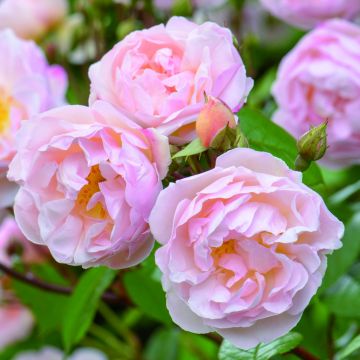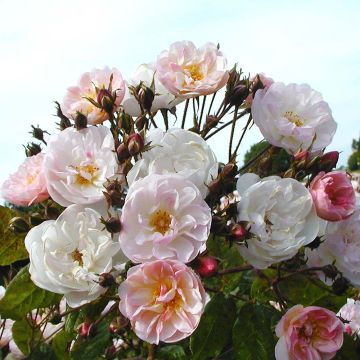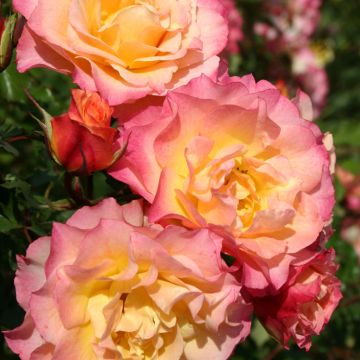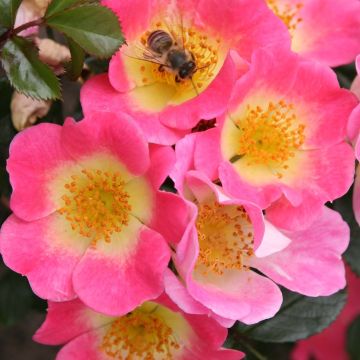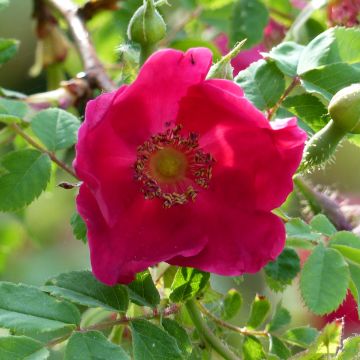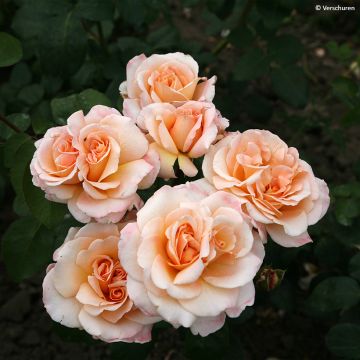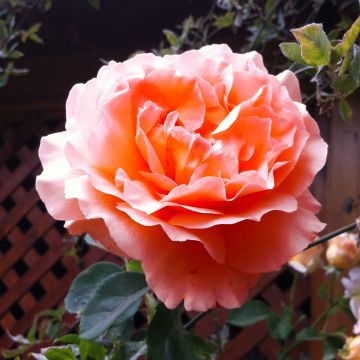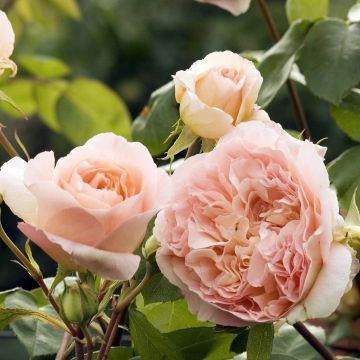Shipping country and language
Your country of residence may be:
Your country of residence is:
For a better user experience on our website, you can select:
Your shipping country:
Andorra
Austria
Belgium
Bulgaria
Canada
Chile
Croatia
Cyprus
Czechia
Denmark
Estonia
Finland
France
Germany
Greece
Hungary
Iceland
Ireland
Italy
Latvia
Lithuania
Luxembourg
Malta
Monaco
Netherlands
Poland
Portugal
Romania
Slovakia
Slovenia
Spain
Sweden
Switzerland
United Kingdom
We only deliver seed and bulb products to your country. If you add other products to your basket, they cannot be shipped.
Language:
French
German
Spanish
English
My Account
Hello
My wish lists
Plantfit
Log in / Register
Existing customer?
New customer?
Create an account to track your orders, access our customer service and, if you wish, make the most of our upcoming offers.
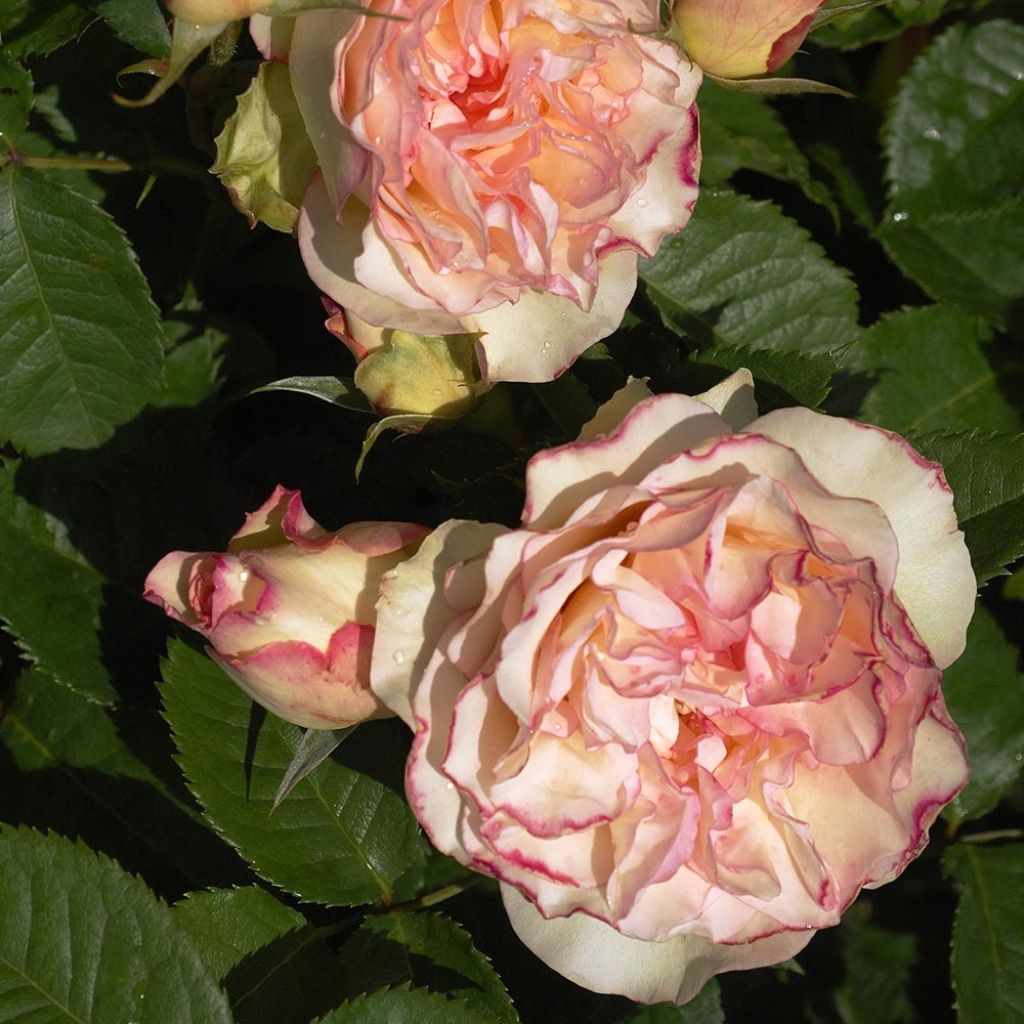

Rosa Perfume Kisses - Standard Rose
View more pictures
Hide images

Thierry P.

Floraison de juin - image 8
Thierry P. • 84 FR

Thierry P.

Floraison de septembre - image 18
Thierry P. • 84 FR
Rosa Perfume Kisses - Standard Rose
Rosa Perfume Kisses 'Wekmootono'
Why not try an alternative variety in stock?
View all →Order in the next for dispatch today!
Dispatch by letter from €3.90.
Delivery charge from €5.90 Oversize package delivery charge from €6.90.
More information
This item is not available in your country.
Schedule delivery date,
and select date in basket
This plant carries a 24 months recovery warranty
More information
We guarantee the quality of our plants for a full growing cycle, and will replace at our expense any plant that fails to recover under normal climatic and planting conditions.
Oversize package: home delivery by special carrier from €6.90 per order..
Express home delivery from €8.90.
Oversize package: home delivery by special carrier from €6.90 per order..
Express home delivery from €8.90.

Does this plant fit my garden?
Set up your Plantfit profile →
Description
The 'Perfume Kisses' or 'Wekmootono' Standard Rose forms a lovely small tree. Its crown is adorned with double cream-white roses washed with tender carmine pink, delicately edged with carmine pink, which exude a powerful fragrance with fruity and aniseed notes. They bloom in clusters from late spring to autumn. It is also a highly disease-resistant variety, awarded the prestigious German ADR label. With its high ornamental value, it deserves a prime spot in the garden or a container on the terrace.
Standard roses are created by grafting a chosen variety, such as Friesia, onto the upright stem of a different type of rose, such as Rosa canina, R. laxa, or R. multiflora. This grafting process occurs at a specific height, typically between 90 to 100 cm (35 to 39 in) from the ground. It may be necessary to protect the rootstock during the winter months, especially in very cold regions.
The 'Perfume Kisses' rose belongs to the Floribunda rose group, which produces flower clusters. Grafted as a standard rose, it displays a characteristic habit with a slender, straight trunk that supports a more or less rounded and spreading bushy crown. Its stems, adorned with thorns, bear leaves divided into 5 dentate leaflets of fairly bright green colour, naturally resistant to diseases. The deciduous foliage falls in autumn. Flowering begins in late May or early June and is repeated in successive waves until the first frost if the soil remains moist. The 'Perfume Kisses' roses are double, medium-sized, composed of slightly crinkled petals blending cream and pale pink, with a fine border of a deeper pink. They are highly fragrant, especially in calm and warm weather.
ADR is the label of the German Federation of Rose Breeders. The ADR designation is only granted to varieties that have undergone the strictest tests in the world. The plants are tested simultaneously at 10 different locations under various soil and climate conditions for several years. The tests cover hardiness, perennial nature and flowering without the use of any pesticides.
The 'Perfume Kisses' standard rose is best planted in a prominent position, at the centre of a flower bed, among low-growing perennials or shrubs, along a pathway, near a terrace, or even in a large pot on a balcony. It can also be planted in groups of 3 specimens, arranged in a triangle, or as a standalone on a lawn. It pairs well with perennial geraniums (Geranium Blue Cloud, Anne Folkard, Nimbus, Orion), bellflowers (lactiflora, rapunculoides), catmints, snapdragons, foxgloves... Standard roses are perfect for adding volume to clusters of bush roses or ground cover.
Created by Tom Carruth (USA) in 2014
Plant habit
Flowering
Foliage
Botanical data
Rosa
Perfume Kisses 'Wekmootono'
Rosaceae
Cultivar or hybrid
Other Tree Roses - Stem Roses
Planting and care
Plant it in well-drained soil between November and March. Roses like clay soil, but if the soil is sandy, compact or dry, add compost to the planting hole. Don't plant it in waterlogged soil in winter. Place it in a sunny or partially shaded area. Roses need a lot of nutrients, so use a specific fertiliser at the start of vegetation and throughout the flowering period. To encourage repeat flowering, remove faded flowers regularly. Prune the stems by about one-quarter of their length (from 4 to 6 buds from the base of the stem) in March. Prune above an outward-facing bud so that the bush can fill out and the branches don't become tangled in the centre of the canopy. Floribunda rose varieties are more vigorous and floriferous than large-flowered rose varieties.
If you live in an area with very cold winters, protect the graft of standard roses (the "trunk") by wrapping it with a thick winter cover.
Roses may develop unsightly spots at the end of summer, but this is a natural occurrence and doesn't harm the rose's growth.
Planting period
Intended location
Care
This item has not been reviewed yet - be the first to leave a review about it.
Roses by purpose
Haven't found what you were looking for?
Hardiness is the lowest winter temperature a plant can endure without suffering serious damage or even dying. However, hardiness is affected by location (a sheltered area, such as a patio), protection (winter cover) and soil type (hardiness is improved by well-drained soil).

Photo Sharing Terms & Conditions
In order to encourage gardeners to interact and share their experiences, Promesse de fleurs offers various media enabling content to be uploaded onto its Site - in particular via the ‘Photo sharing’ module.
The User agrees to refrain from:
- Posting any content that is illegal, prejudicial, insulting, racist, inciteful to hatred, revisionist, contrary to public decency, that infringes on privacy or on the privacy rights of third parties, in particular the publicity rights of persons and goods, intellectual property rights, or the right to privacy.
- Submitting content on behalf of a third party;
- Impersonate the identity of a third party and/or publish any personal information about a third party;
In general, the User undertakes to refrain from any unethical behaviour.
All Content (in particular text, comments, files, images, photos, videos, creative works, etc.), which may be subject to property or intellectual property rights, image or other private rights, shall remain the property of the User, subject to the limited rights granted by the terms of the licence granted by Promesse de fleurs as stated below. Users are at liberty to publish or not to publish such Content on the Site, notably via the ‘Photo Sharing’ facility, and accept that this Content shall be made public and freely accessible, notably on the Internet.
Users further acknowledge, undertake to have ,and guarantee that they hold all necessary rights and permissions to publish such material on the Site, in particular with regard to the legislation in force pertaining to any privacy, property, intellectual property, image, or contractual rights, or rights of any other nature. By publishing such Content on the Site, Users acknowledge accepting full liability as publishers of the Content within the meaning of the law, and grant Promesse de fleurs, free of charge, an inclusive, worldwide licence for the said Content for the entire duration of its publication, including all reproduction, representation, up/downloading, displaying, performing, transmission, and storage rights.
Users also grant permission for their name to be linked to the Content and accept that this link may not always be made available.
By engaging in posting material, Users consent to their Content becoming automatically accessible on the Internet, in particular on other sites and/or blogs and/or web pages of the Promesse de fleurs site, including in particular social pages and the Promesse de fleurs catalogue.
Users may secure the removal of entrusted content free of charge by issuing a simple request via our contact form.
The flowering period indicated on our website applies to countries and regions located in USDA zone 8 (France, the United Kingdom, Ireland, the Netherlands, etc.)
It will vary according to where you live:
- In zones 9 to 10 (Italy, Spain, Greece, etc.), flowering will occur about 2 to 4 weeks earlier.
- In zones 6 to 7 (Germany, Poland, Slovenia, and lower mountainous regions), flowering will be delayed by 2 to 3 weeks.
- In zone 5 (Central Europe, Scandinavia), blooming will be delayed by 3 to 5 weeks.
In temperate climates, pruning of spring-flowering shrubs (forsythia, spireas, etc.) should be done just after flowering.
Pruning of summer-flowering shrubs (Indian Lilac, Perovskia, etc.) can be done in winter or spring.
In cold regions as well as with frost-sensitive plants, avoid pruning too early when severe frosts may still occur.
The planting period indicated on our website applies to countries and regions located in USDA zone 8 (France, United Kingdom, Ireland, Netherlands).
It will vary according to where you live:
- In Mediterranean zones (Marseille, Madrid, Milan, etc.), autumn and winter are the best planting periods.
- In continental zones (Strasbourg, Munich, Vienna, etc.), delay planting by 2 to 3 weeks in spring and bring it forward by 2 to 4 weeks in autumn.
- In mountainous regions (the Alps, Pyrenees, Carpathians, etc.), it is best to plant in late spring (May-June) or late summer (August-September).
The harvesting period indicated on our website applies to countries and regions in USDA zone 8 (France, England, Ireland, the Netherlands).
In colder areas (Scandinavia, Poland, Austria...) fruit and vegetable harvests are likely to be delayed by 3-4 weeks.
In warmer areas (Italy, Spain, Greece, etc.), harvesting will probably take place earlier, depending on weather conditions.
The sowing periods indicated on our website apply to countries and regions within USDA Zone 8 (France, UK, Ireland, Netherlands).
In colder areas (Scandinavia, Poland, Austria...), delay any outdoor sowing by 3-4 weeks, or sow under glass.
In warmer climes (Italy, Spain, Greece, etc.), bring outdoor sowing forward by a few weeks.
